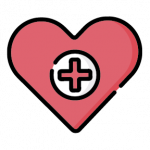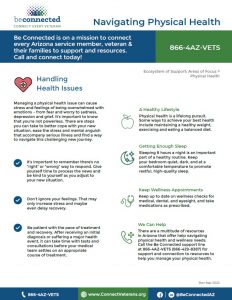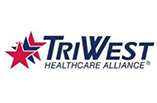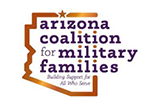Explore the 10 Areas of Focus within the The Be Connected Ecosystem of Support
Supporting total body wellness including nutrition, exercise and ensuring all of the appropriate partners are coordinating total care.

A physical health problem can disrupt many aspects of your life. You may feel overwhelmed with difficult emotions from fear and worry to sadness, depression, and grief. Whatever the diagnosis or emotional response, it’s important to know that you’re not powerless. There are steps you can take to better cope with your new situation, ease the stress and mental anguish that often accompany serious illness, and find a way to navigate this challenging new journey.
Physical Health FAQs
- Working on physical health should be a lifelong endeavor. Factors such as maintaining a healthy weight, exercising, eating a well-balanced diet, sleeping 8-9 hours a night, limiting alcohol and sugar intake, avoiding recreational drugs and cigarettes and staying hydrated all contribute to keeping our bodies healthy. In addition, consider keeping up to date on yearly well checks for medical, dental and eyesight, and taking any medications as prescribed.
- Maintain a healthy weight with diet and exercise.
- Eat a well-balanced diet and limit alcohol and sugar intake. In addition, stay hydrated by drinking 8-10 glasses of water daily.
- Sleep 8-9 hours a night by going to bed regularly, hydrated and in a comfortable temperature environment.
- Avoid recreational drugs and cigarettes, vaping.
- Consider keeping up to date on yearly well checks for medical, dental and eyesight, and taking any medications as prescribed.
- Suppose you or a family member are struggling with a physical health issue. In that case, you or they could be a vulnerable target for being taken advantage of financially or at risk of sexual, physical and mental exploitation or abuse. If you are worried about yourself, you can ask for help from your local Adult Protective Services, medical providers or any local crisis line.
- If you are worried about a family member or friend, many local social service agencies can help by assigning case managers or navigators to review needs. The Guardianship or payee services process is also available after legal involvement and can give a third-party agency control of getting bills paid and managing money. In addition, Be Connected offers a needs assessment by caring, skilled, and trained staff and can Connect Arizona service members, veterans, families to information, support, and appropriate resources, following an assessment. Please call Be Connected at 866-4AZVETS (866-429-8387) for additional assistance.
Many resources in the state of Arizona offer help, including community, government and military benefits. However, these systems can be complex and overwhelming to work through, especially when seeking a resolution to an immediate need. Be Connected uses a resource matching tool to help find the right information and resources that best fit your situation. Please call 866-429-8387 for additional assistance.
The ten areas of focus include Basic Needs, Employment, Family & Social Supports, Finances & Benefits, Higher Education, Housing & Homelessness, Legal, Mental Health & Substance Abuse, Physical Health and Spirituality.
Click here to view the other 10 Areas of Focus Be Connected can help with!





